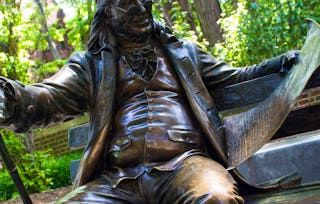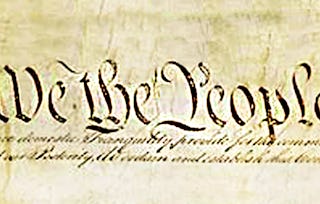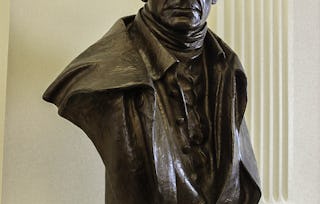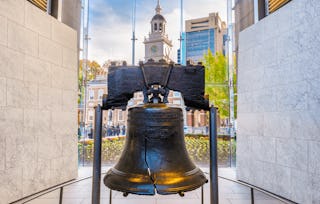This course provides an overview of Thomas Jefferson's work and perspectives presented by the University of Virginia in partnership with Thomas Jefferson’s Monticello. Together, UVA and Monticello are recognized internationally as a UNESCO World Heritage Site.

Age of Jefferson

461 reviews
Skills you'll gain
Details to know

Add to your LinkedIn profile
7 assignments
See how employees at top companies are mastering in-demand skills

There are 7 modules in this course
Thomas Jefferson is an American icon. He has also been one of the most polarizing and controversial figures in American history. In this introductory module, we’ll explore how Jefferson’s reputation has changed and evolved over the last two centuries. We’ll discover what Jefferson considered to be his most important contribution to the “Age of Enlightenment” in which he was living. We’ll discuss why some people in both the nineteenth and twentieth centuries have viewed Jefferson and his ideas with skepticism or worse while others have embraced Jefferson. Overall, learning about how people from many different backgrounds and perspectives have interpreted Jefferson throughout history will help us understand why it’s so important to think critically and honestly about Jefferson’s life and legacy today.
What's included
6 videos1 reading1 assignment
No document is more closely associated with Jefferson than the Declaration of Independence. Listing it as the first of three achievements on his tombstone, Jefferson clearly believed the Declaration to be of profound importance. Generations of Americans have agreed, constantly quoting its phrases and invoking its ideas. But do we really understand what Jefferson was trying to do when he wrote the Declaration? In this module, we’ll explore the Revolutionary context in which Jefferson lived and worked. We’ll ask why the Declaration takes the form that it does, and also what Jefferson hoped it would accomplish. Surprisingly, the parts of the Declaration that we celebrate most frequently today may not be the ones Jefferson would have understood to be the most important.
What's included
5 videos1 reading1 assignment
The man who wrote in the Declaration of Independence that “all men are created equal” was a lifelong slaveowner whose affluence rested on the exploitation of hundreds of African Americans. In this module, we travel to Montalto, the mountain overlooking Jefferson’s home and plantation on Monticello, to try to gain some perspective on this great tension in Jefferson’s life and thought. Our goal will be neither simply to exonerate nor to castigate Jefferson, but rather to understand how he viewed slavery and his relationship to it. Only by confronting and considering this complicated, frustrating, and tragic chapter in American history can we come to a more complete and nuanced understanding of Thomas Jefferson and his legacy. As students attending the University Jefferson founded, it is especially important to engage this topic.
What's included
5 videos2 readings1 assignment
The role of religion in public life continues to be a topic of debate today in both the United States and around the world. Thomas Jefferson was never happier than when his Bill for Religious Freedom was finally enacted in Virginia in 1786. In this module, we’ll try to understand why Jefferson believed freedom of religion to be so essential to the future of the United States. To do this, we’ll explore the historical context in which Jefferson developed his ideas about the proper relationship between religious denominations and the state. We’ll also investigate Jefferson’s own faith—a subject of much controversy from his own day through the present. Considering Jefferson’s serious engagement with questions of religion will help us understand the kinds of communities and society he hoped would take hold and flourish in the new nation.
What's included
6 videos1 reading1 assignment
Founding the University of Virginia in 1819 was the most obvious example of Jefferson’s interest in education, but it was by no means the first time he considered the subject. Indeed, education was one of Jefferson’s constant preoccupations. In this session, we’ll discuss Jefferson’s ideas about education as they developed over the course of his life, from the ambitious plan for a state-supported system of schools outlined in his “Bill for the More General Diffusion of Knowledge,” to his conclusion in the early nineteenth century that the other institutions of higher learning that existed in the United States just weren’t suited to forming the leaders of a free republic. Throughout the discussion, we’ll try to understand why Jefferson was so focused on education by asking what he believed was at stake if Americans failed in their duty to provide proper instruction for future generations.
What's included
5 videos1 reading1 assignment
In 1789, Jefferson wrote a letter to James Madison from Paris in which he asserted that “the earth belongs to the living.” Calculating that a single generation could be said to last nineteen years, he proposed that no debts should be incurred that could not be paid off in nineteen years; that all laws should be re-written every nineteen years; and that Americans should re-write even their constitutions every nineteen years. Madison thought the ideas Jefferson outlined in this letter to be wildly impractical, and most commentators since then have come to the same conclusion. In this module, however, we’ll explore what Jefferson was getting at in claiming that “the earth belongs to the living.” In so doing, we’ll discover how this phrase expresses an idea that lies at the very core of Jefferson’s conception of equality, democracy, and the American nation.
What's included
6 videos1 reading1 assignment
What's included
1 assignment
Instructor

Offered by
Explore more from History
 Status: Free
Status: FreeUniversity of Pennsylvania
 Status: Preview
Status: PreviewUniversity of Pennsylvania
 Status: Preview
Status: PreviewUniversity of Virginia
 Status: Free Trial
Status: Free TrialO.P. Jindal Global University
Why people choose Coursera for their career

Felipe M.

Jennifer J.

Larry W.

Chaitanya A.
Learner reviews
- 5 stars
78.69%
- 4 stars
16.30%
- 3 stars
2.82%
- 2 stars
1.08%
- 1 star
1.08%
Showing 3 of 461
Reviewed on Sep 1, 2017
Good course with vital information about Mr. Jefferson. Lectures were well done and helped that they were split up at times.
Reviewed on Sep 3, 2017
Great Course! Not being from here, this course helped me understand some fundamental differences between Canadian and American history; and the obvious differences in our cultures today.
Reviewed on Jul 24, 2016
Fantastic course by Dr. Onuf! I learned much and he helped correct misconceptions I harbored regarding Thomas Jefferson. Great videos and selected readings. The quizzes were relatively challenging.

Open new doors with Coursera Plus
Unlimited access to 10,000+ world-class courses, hands-on projects, and job-ready certificate programs - all included in your subscription
Advance your career with an online degree
Earn a degree from world-class universities - 100% online
Join over 3,400 global companies that choose Coursera for Business
Upskill your employees to excel in the digital economy
Frequently asked questions
To access the course materials, assignments and to earn a Certificate, you will need to purchase the Certificate experience when you enroll in a course. You can try a Free Trial instead, or apply for Financial Aid. The course may offer 'Full Course, No Certificate' instead. This option lets you see all course materials, submit required assessments, and get a final grade. This also means that you will not be able to purchase a Certificate experience.
When you purchase a Certificate you get access to all course materials, including graded assignments. Upon completing the course, your electronic Certificate will be added to your Accomplishments page - from there, you can print your Certificate or add it to your LinkedIn profile.
Yes. In select learning programs, you can apply for financial aid or a scholarship if you can’t afford the enrollment fee. If fin aid or scholarship is available for your learning program selection, you’ll find a link to apply on the description page.
More questions
Financial aid available,

